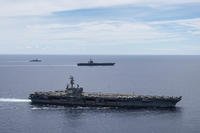Despite a new round of defense spending cuts on the horizon, Navy Secretary Ray Mabus said he has no plans to scale back plans to grow the fleet or execute the defense strategy that calls for a pivot to the Pacific.
"We must remember that isolationism just isn't an option … we are the world's only global Navy," Mabus said during a luncheon Wednesday at the Navy League's Sea, Air and Space Expo at National Harbor, Md. "We have to be forward deployed to defend the American people and to protect out national interests."
Mabus' comments came as the Pentagon unveiled its $527 billion base budget for 2014. The overall White House's $3.77 trillion federal budget assumes lawmakers will reach a deal to avoid sequestration, including reducing automatic defense cuts over the next decade to $100 billion, down from $500 billion.
The new spending plan includes an additional $150 billion in defense reductions over the next 10 years, but Mabus said the new cuts are "concentrated toward the end of that time, giving us the opportunity to plan."
The Navy stands to get another $23.3 billion for ships such as the Virginia-class submarine, Littoral Combat Ship and Aegis destroyer.
Mabus, who took over as secretary of the Navy in 2009, continues to push for a larger fleet.
"From the moment I took office, ship building and making sure our sailors and Marines have the right platforms for success has been a priority for me," he said.
Between 2001 and 2008, the Navy's fleet shrank from 316 ships to 278 ships. That same year, the service placed three ships under contract, said Mabus. Since December 2010, the Navy has contracted 47 ships.
"We are executing a plan that arrests the declining number of ships, and soon the fleet will begin to grow with more and more capable ships," Mabus said. "The budget and the plan we have submitted to Congress brings the fleet to 300 ships before the end of this decade."
This represents a "critical turnaround" since the Pentagon's new defense strategy is largely maritime and focuses on the Pacific and Gulf regions, Mabus said.
"In the coming years, we are going to be moving more of our ships and their crews forward," he said.
Part of the forward basing plan includes basing four DDG 51 destroyers in Spain for "ballistic-missile defense patrols" under security cooperation efforts in the European and African regions, Mabus said.
"By forward basing these four, they take the place of 10 ships if we were rotationally-deploying them from the United States," he said.
Similarly, the Navy will be forward basing four Littoral Combat Ships in Singapore.
"We are going to be using these LCS differently; the ships will remain and the crews will rotate," Mabus said, emphasizing how important forward basing is to partnership building in the future. "I will tell you that countries around the world recognize the value of our Navy and its forward deployed forces as much as we do."






























